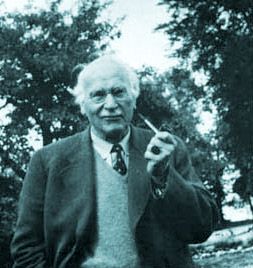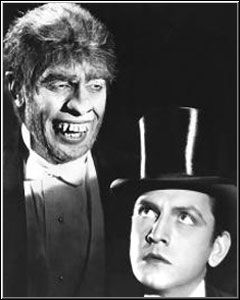The
shadow, said celebrated Swiss psychiatrist C.G. Jung (
A Dangerous Method), is the unknown ‘‘dark side’’ of our
personality–-dark both because it tends to consist predominantly of the primitive, negative, socially or religiously depreciated human emotions and impulses like sexual lust, power strivings, selfishness, greed,
envy,
anger or rage, and due to its unenlightened
nature, completely obscured from consciousness. (See my prior posts on
anger and
greed.) Whatever we deem evil, inferior or unacceptable and deny in ourselves becomes part of the shadow, the counterpoint to what Jung called the
persona or conscious ego personality. According to Jungian analyst Aniela Jaffe, the shadow is the ‘‘sum of all personal and collective psychic elements which, because of their incompatibility with the chosen conscious attitude, are denied expression in life’’. Indeed, Jung differentiated between the
personal shadow and the impersonal or
archetypal shadow, which acknowledges transpersonal, pure or radical evil (symbolized by the Devil and demons) and collective evil, exemplified by the horror of the Nazi holocaust. Literary and historical figures like Adolf Hitler, Charles Manson, and Darth Vader personify the shadow embodied in its most negative archetypal human form. (
For Jung ( the theory of the‘‘shadow’’ was a metaphorical means of conveying the prominent role played by the
unconscious in both psychopathology and the perennial problem of evil. In developing his paradoxical conception of the shadow, Jung sought to provide a more highly differentiated, phenomenologically descriptive version of the
unconscious and of the
id than previously proffered by Freud. The
shadow was originally Jung’s poetic term for the totality of the unconscious, a notion he took from philosopher Friedrich Nietzsche. But foremost for Jung was the task of further illuminating the shadowy problem of human evil and the prodigious dangers of excessive unconsciousness.
Especially concerned with those pathological mental states historically known as ‘‘demonic possession’’ , Jung’s psychological construct of the shadow corresponds to yet differs fundamentally from the idea of the Devil or Satan in theology. As a parson’s son, Jung was steeped in the Protestant mythos, digested the rich symbolism of Catholicism, and studied the other great
religious and philosophical systems. But, as a physician and psychiatrist, he intentionally employed the more mundane, banal, less esoteric or metaphysical and, therefore more rational terminology ‘‘the shadow’’ and ‘‘the unconscious’’ instead of the traditional religious language of god, devil,
daimon or
mana. For Jung, depth psychological designations such as the
shadow or the
unconscious, were ‘‘coined for scientific purposes, and [are] far better suited to dispassionate observation which makes no metaphysical claims than are the transcendental concepts, which are controversial and therefore tend to breed fanaticism’’
‘‘The shadow,’’ wrote Jung (1963), is ‘‘that hidden, repressed, for the most part inferior and guilt-laden personality whose ultimate ramifications reach back into the realm of our animal ancestors and so comprise the whole historical aspect of the unconscious’’ (cited in Diamond, p. 96). The shadow is a primordial part of our human inheritance, which, try as we might, can never be eluded. The pervasive
Freudian defense mechanism known as
projection is how most people deny their shadow, unconsciously casting it onto others so as to avoid confronting it in oneself. Such projection of the shadow is engaged in not only by individuals but groups, cults, religions, and entire countries, and commonly occurs during wars and other contentious conflicts in which the outsider, enemy or adversary is made a scapegoat, dehumanized, and demonized. Two World Wars and the current escalation of violence testify to the terrible truth of this collective phenomenon. Since the turn of the twenty-first century we are witnessing a menacing resurgence of epidemic demonization or collective psychosis in the seemingly inevitable violent global collision between radical Islam and Judeo-Christian or secular western culture, each side projecting its collective shadow and perceiving the other as evil incarnate.
The shadow is most destructive, insidious and dangerous when habitually repressed and projected, manifesting in myriad psychological disturbances ranging from
neurosis to psychosis, irrational interpersonal hostility, and even cataclysmic international clashes. Such deleterious symptoms, attitudes and behavior stem from being possessed or driven by the dissociated yet undaunted shadow. Robert Louis Stevenson’s classic story of
The Strange Case of Dr. Jekyll and Mr. Hyde can be taken as a cautionary tale
par excellence: dissociation of the shadow results in a perilously lopsided development of the conscious personality and renders us susceptible to destructive possession by the disowned shadow. The excessively good (almost saintly) Dr. Henry Jekyll is at times taken over body and soul by his equally evil shadow: the depraved, nefarious, psychopathic, wicked Edward Hyde, his complete opposite. Indeed, the shadow contains all those qualities we hide from ourselves and others, but which remain active within the unconscious, forming a sort of ‘‘splinter personality’’ or
complex, not unlike the relatively autonomous sub-personalities found in multiple personality (dissociative
identity disorder) or in so-called demonic possession or demonism. Under stressful circumstances or in states of fatigue or intoxication, this compensatory alter ego or shadow complex can be triggered into temporarily taking total command of the conscious will. The abject negativity and destructiveness of the shadow is largely a function of the degree to which the individual neglects and refuses to take responsibility for it, only inflaming its ferocity and pernicious power. The shadow’s sometimes overwhelming strength and disturbing ability to intrude into one’s cognitions, affects and behavior has historically been experienced and misinterpreted as
demonic possession, for which exorcism is believed to be the only treatment (see my
prior post).
Yet, the shadow, while very real, is not meant to be taken concretely or literally but rather, allegorically. It is not an evil entity existing apart from the person, nor an invading alien force, though it may be felt as such. The shadow is a universal (archetypal) feature of the human psyche for which we bear full responsibility to cope with as creatively as possible. But despite its well-deserved reputation for wreaking havoc and engendering widespread suffering in human affairs, the shadow–in distinction to the literal idea of the devil or demons–can be redeemed: The shadow must never be dismissed as merely evil or demonic, for it contains natural, life-giving, underdeveloped positive potentialities too. Coming to terms with the shadow and constructively accepting and assimilating it into the conscious personality is central to the process of Jungian analysis.
Working with dream material () is key to comprehending and dealing creatively with the shadow. The shadow tends to appear in
dreams as a figure of the same
sex as the dreamer, but Jung draws a distinction between the personal shadow and the
anima or
animus (see my
prior post), symbolized in dreams as the opposite
sex. Typically, it is the subjective experience of the shadow or evil and its ego-dystonic effects (or, as in the case of the hypercivilized Dr. Jekyll, an inexplicable malaise or vague sense that something vital is missing in us) which motivates the person to seek
psychotherapy and spurs one toward new growth, maturation, balance, integration, wholeness and
individuation. Indeed, in many ways we need the shadow, and must therefore learn to develop a more conscious and constructive relationship to it. Becoming conscious of the shadow requires tolerating the inherent tension of opposites within: sometimes ‘‘having it out’’ with the shadow and standing up to its destructive influence; other times permitting it some measured outward expression in the personality. But always treating it with utmost respect.
Notwithstanding its negative influence, Jung well understood the
daimonic nature of the unconscious, and that the compensatory effects of the shadow upon individuals, couples, groups and nations could be beneficial as well: ‘‘If it has been believed hitherto that the human shadow was the source of all evil, it can now be ascertained on closer investigation that the unconscious man, that is, his shadow, does not consist only of morally reprehensible tendencies, but also displays a number of good qualities, such as normal instincts, appropriate reactions, realistic insights, creative impulses, etc’’ (cited in Diamond, p. 96).
Creativity can spring from the constructive expression or integration of the shadow, as can true
spirituality. Authentic spirituality requires consciously accepting and relating properly to the shadow as opposed to repressing, projecting, acting out and remaining naively unconscious of its repudiated, denied, disavowed contents, a sort of precarious
pseudospirituality. ‘‘Bringing the shadow to consciousness,’’ writes another of Jung’s followers, Liliane Frey-Rohn (1967), ‘‘is a psychological problem of the highest
moralsignificance. It demands that the individual hold himself accountable not only for what happens to him, but also for what he projects. . . Without the conscious inclusion of the shadow in daily life there cannot be a positive relationship to other people, or to the creative sources in the soul; there cannot be an individual relationship to the Divine’’ (cited in Diamond, p. 109).














